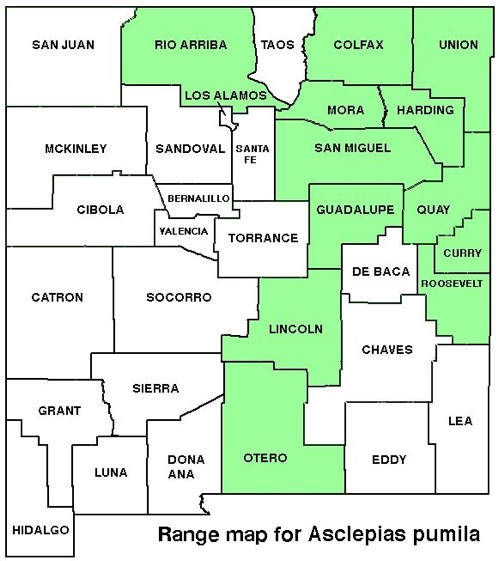WILDFLOWERS OF NEW MEXICO

A dense foliage of needle-like leaves and tight clusters of small, white, rosy to yellowish-green flowers cover the 8–20-inch tall stems of this distinctive milkweed. The sap is milky.
FLOWER: April–September. Dense, rounded clusters of white or pink-tinted flowers form at upper nodes just below the branch tips. 5 erect, tubular hoods with small, pointed horns surround the central column, and 5 white, petal-like lobes fold back against the stem with the tips spreading wide beneath the flower. The 1 1/2–2 1/2-inch long seed pods mature upright.
LEAVES: Alternate in irregular spirals, densely crowded on the stems; the 1/2–2-inch long (1.2–5 cm) by 1 mm wide leaves look like miniature pine needles.
HABITAT: Sandy, loamy, calcareous soils, foothills; shortgrass prairies, mesquite-grasslands.
ELEVATION: 4,000–7,200 feet.
RANGE: CO, IA, KS, MY, ND, NE, NM, OK, SD, TX, WY.
SIMILAR SPECIES: The short, needle-like leaves distinguish this from the other 32 species of milkweed in NM.
NM COUNTIES: Eastern NM in low- to mid-elevation, dry habitats: Colfax, Curry, Guadalupe, Harding, Lincoln, Mora, Otero, Quay, Rio Arriba, Roosevelt, San Miguel, Union..

PLAINS MILKWEED
ASCLEPIAS PUMILA
Dogbane Family, Apocynaceae (formerly Milkweed Family, Asclepiadaceae)
Perennial herb
THE CONTENTS OF THIS WEBSITE ARE COPYRIGHTED AND CANNOT BE USED
WITHOUT PERMISSION OF GEORGE OXFORD MILLER



-
1.Hoods of flower (lower arrow)
-
2. Horns inside hoods. (middle arrow)
-
3. Petals with tips spread wide. (upper arrow)




EMAIL ME